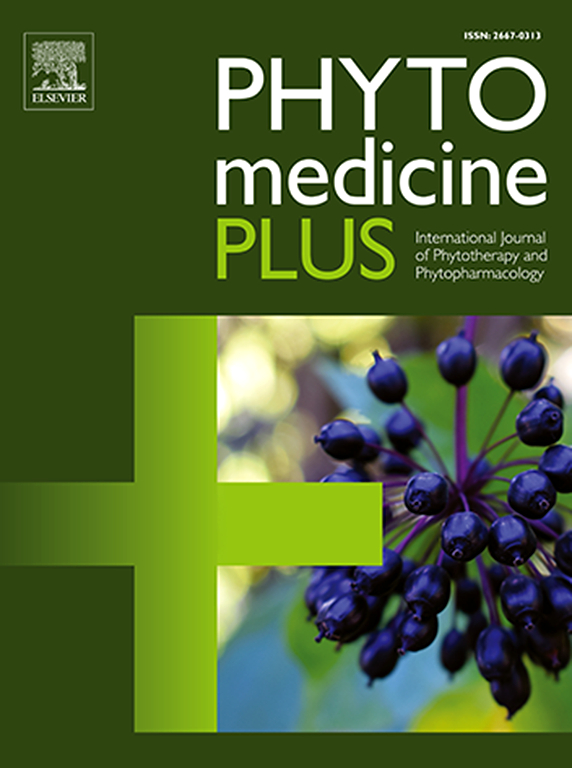凤尾草凝集素的纯化与表征:微阿片受体介导的抗伤及胃保护活性
Q3 Pharmacology, Toxicology and Pharmaceutics
引用次数: 0
摘要
凤凰(枣椰树)具有重要的药用价值,特别是在传统医学中。本研究的重点是纯化和表征从其种子中提取的凝集素(PdSL),并评估其物理化学稳定性,糖蛋白性质和治疗特性,包括镇痛和胃保护活性。PdSL通过磷酸盐缓冲盐水(PBS)提取,通过离子交换和亲和层析纯化,纯度提高了两倍。稳定性测试包括不同温度(40-100°C)、pH值(2-13)和暴露于变性剂中。采用生物实验方法评价其在热板(热板,p <;0.05)和化学(醋酸扭体,p <;0.01)疼痛模型。在乙醇性胃溃疡模型大鼠中评估胃保护活性,P <值有统计学意义;0.05. PdSL表现出优异的稳定性,在很宽的温度范围(高达100°C)和pH值(5.5-9.5)内保持活性。该凝集素在恶劣条件下仍能保持血凝活性,并表现出对绵羊红细胞的特异性和甘露糖结合特性。经鉴定,该糖蛋白具有37.64%的中性糖,并具有腺嘌呤的疏水结合位点。在镇痛试验中,PdSL显著提高了热板试验中的疼痛阈值,特别是在60分钟后6 mg/kg (p <;0.003),在扭体试验中,疼痛抑制率为80 - 89% (p <;0.01)。胃保护活性显示出剂量依赖性溃疡抑制,在1 mg/kg时最大减少89% (p <;0.0001),以及胃ph的正常化。凤凰dactylifera种子的PdSL显示出显着的稳定性和治疗效果,包括缓解疼痛和抗溃疡活性,统计上显著的结果突出了其作为药物开发候选物的潜力。这些发现鼓励在生物医学研究中进一步探索植物源性凝集素。本文章由计算机程序翻译,如有差异,请以英文原文为准。
Purification and characterization of Phoenix dactylifera lectin: µ-Opioid receptor-mediated antinociceptive and gastroprotective activities
Phoenix dactylifera (date palm) holds significant medicinal value, particularly in traditional medicine. This study focuses on purifying and characterizing a lectin (PdSL) extracted from its seeds and assessing its physicochemical stability, glycoprotein nature, and therapeutic properties, including analgesic and gastroprotective activities. PdSL was extracted via phosphate-buffered saline (PBS) and purified via ion exchange and affinity chromatography, resulting in a twofold increase in purity. Stability tests included varying temperatures (40–100 °C), pH levels (2–13), and exposure to denaturing agents. Biological assays were used to evaluate its analgesic effects in thermal (hot plate, p < 0.05) and chemical (acetic acid writhing, p < 0.01) pain models. Gastroprotective activity was assessed in an ethanol-induced gastric ulcer model in rats, with statistical significance at P < 0.05. PdSL demonstrated exceptional stability, retaining activity across a broad range of temperatures (up to 100 °C) and pH values (5.5–9.5). The lectin maintained hemagglutination activity under challenging conditions and showed specificity for sheep erythrocytes and mannose-binding properties. It was identified as a glycoprotein with 37.64 % neutral sugars and exhibited a hydrophobic binding site for adenine. In analgesic assays, PdSL significantly increased the pain threshold in the hotplate test, particularly at 6 mg/kg after 60 mins (p < 0.003), and in the writhing test, with a dose-dependent pain inhibition of 80–89 % (p < 0.01). Gastroprotective activity revealed dose-dependent ulcer inhibition, with a maximum reduction of 89 % at 1 mg/kg (p < 0.0001), along with normalization of the gastric pH. PdSL from Phoenix dactylifera seeds exhibits remarkable stability and therapeutic efficacy, including pain-relieving and antiulcer activities, with statistically significant results highlighting its potential as a candidate for drug development. These findings encourage further exploration of plant-derived lectins in biomedical research.
求助全文
通过发布文献求助,成功后即可免费获取论文全文。
去求助
来源期刊

Phytomedicine Plus
Medicine-Complementary and Alternative Medicine
CiteScore
3.70
自引率
0.00%
发文量
178
审稿时长
81 days
期刊介绍:
 求助内容:
求助内容: 应助结果提醒方式:
应助结果提醒方式:


